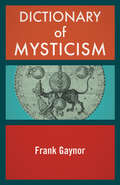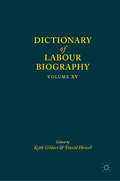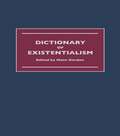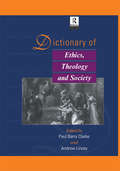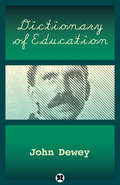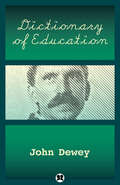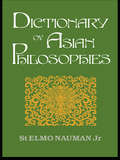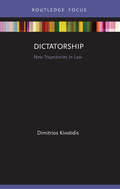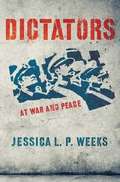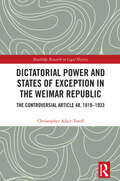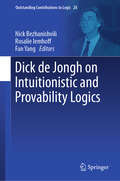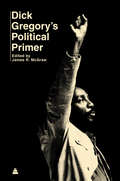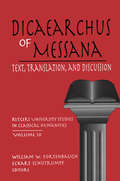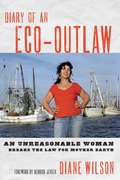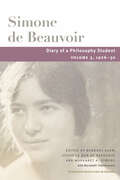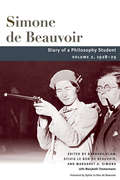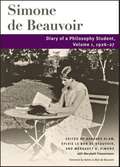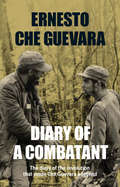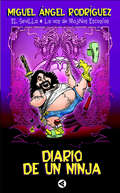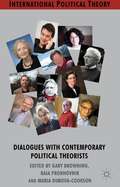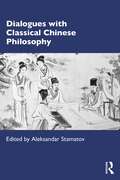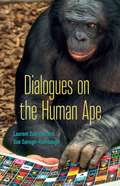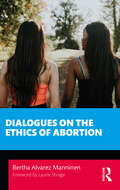- Table View
- List View
Dictionary of Mysticism: Dictionary Of Mysticism, Encyclopedia Of Superstitions, And Dictionary Of Magic
by Frank GaynorMore than 2,200 terms defined in an essential reference on religious mysticism, esoteric philosophy, occultism, and more. Dictionary of Mysticism provides concise definitions for more than 2,200 terms used in many philosophies, religions, and doctrines which relate to the influence of the superhuman and supernatural on man&’s everyday life. Terms relating to esoteric philosophy, occultism, religious mysticism, spiritualism, alchemy, and psychical research are defined. Particular attention is given to the Eastern philosophies of Buddhism, Brahmanism, Sufism, Lamaism, Zoroastrianism, Theosophy, and Cabbalism. Also included are terms used in magic and demonology.
Dictionary of Labour Biography: Volume XV
by David Howell Keith GildartThe Dictionary of Labour Biography has an outstanding reputation as a reference work for the study of nineteenth and twentieth century British history. Volume XV maintains this standard of original and thorough scholarship. Each entry is written by a specialist drawing on an array of primary and secondary sources. The biographical essays engage with recent historiographical developments in the field of labour history. The scope of the volume emphasises the ethnic and national diversity of the British labour movement and neglected political traditions.
Dictionary of Global Bioethics
by Henk ten Have Maria do Patrão NevesThis Dictionary presents a broad range of topics relevant in present-day global bioethics. With more than 500 entries, this dictionary covers organizations working in the field of global bioethics, international documents concerning bioethics, personalities that have played a role in the development of global bioethics, as well as specific topics in the field.The book is not only useful for students and professionals in global health activities, but can also serve as a basic tool that explains relevant ethical notions and terms. The dictionary furthers the ideals of cosmopolitanism: solidarity, equality, respect for difference and concern with what human beings- and specifically patients - have in common, regardless of their backgrounds, hometowns, religions, gender, etc. Global problems such as pandemic diseases, disasters, lack of care and medication, homelessness and displacement call for global responses.This book demonstrates that a moral vision of global health is necessary and it helps to quickly understand the basic ideas of global bioethics.
Dictionary of Existentialism
by Haim GordonExistentialism, as a philosophy, gained prominence after World War II. Instead of focusing upon a particular aspect of human existence, existentialists argued that our focus must be upon the whole being as he/she exists in the world. Rebelling against the rationalism of such philosophers as Descartes and Hegel, existentialists reject the emphasis placed on man as primarily a thinking being. Freedom is central to human existence, and human relations and encounters cannot be reduced simply to "thinking." This Dictionary provides--through alphabetically arranged entries--overviews of the various tenets, philosophers, and writers of existentialism, and of those writers/philosophers who, in retrospect, seem to existentialists to espouse their philosophy: Nietzsche, Kierkegaard, Dostoyevski, et al.
Dictionary of Ethics, Theology and Society
by Andrew Linzey Paul A. ClarkeThis Dictionary provides a unique and groundbreaking survey of both the historical and contemporary interrelations between ethics, theology and society. In over 250 separately-authored entries, a selection of the world's leading scholars from many disciplines and many denominations present their own views on a wide range of topics.Arranged alphabetically, entries cover all aspects of philosophy, theology, ethics, economics, politics and government. Each entry includes:* a concise definition of the term* a description of the principal ideas behind it* analysis of its history, development and contemporary relevance* a detailed bibliography giving the major sources in the fieldThe entire field is prefaced by an editorial introduction outlining its scope and diversity.Selected entries include:Animal Rights * Capital Punishment * Communism * Domestic Violence * Ethics * Evil * Government * Homophobia * Humanism * Liberation Theology * Politics * Pornography * Racism * Sexism * Society * Vivisection * Women's Ordination
Dictionary of Education
by John DeweyDictionary of Education is a comprehensive resource on John Dewey's approach to education. With smart, concise definitions pertaining to Dewey's philosophies, editor Ralph B. Winn has constructed a classic dictionary and indispensable tool for anyone who wants ready access to Dewey's most incisive thought on crucial points in the study of education.
Dictionary of Education
by John DeweyThis comprehensive A-to-Z resource covers the eminent philosopher&’s influential theories on education.One of the most prominent American philosophers of the twentieth century, John Dewey was also a major proponent of educational reform. He wrote extensively on teaching and pedagogy in works such as The School and Society, The Child and the Curriculum, and Democracy and Education, among others.Dictionary of Education is an authoritative reference volume on the subject of Dewey&’s approach to learning. With smart, concise definitions, editor Ralph B. Winn has constructed an indispensable tool for anyone who wants ready access to Dewey&’s ideas and his particular usage of terminology.
Dictionary of Asian Philosophies
by St. Elmo Nauman JrSpanning three thousand years and five major cultures, the traditions of Eastern philosophy play a major role in any study of human thought today; to ignore the East is to miss the valuable insights of philosophers from the Persian, Indian, Chinese, Tibetan and Japanese traditions. In this book, every major stream of Eastern thought, whether idealistic or materialistic, is presented. The author reveals here the wisdom of the East, from Avicenna to Zoroaster, from Buddha to Gandhi. Entries cover not only the philosophers themselves but also the philosophical terms and concepts, the historical background, the doctrines, teachings and writings of the East. Whether we wish to consult the I Ching, to understand Zen koan, or to read from the Upanishads, this volume will be a valuable tool in our quest.
Dictatorship: New Trajectories in Law (New Trajectories in Law)
by Dimitrios KivotidisThis book analyses the institution and concept of dictatorship from a legal, historical and theoretical perspective, examining the different types of dictatorship, their relationship to the law, as well as the analytical value of the concept in contemporary world. In particular, it seeks to codify the main theories and conceptions of ‘dictatorship’, with the goal of unearthing their contradictions. The book’s main premise is that the concept of dictatorship and the different types of the dictatorial form have to be assessed and can only be understood in their historical context. On this basis, the elaborations on dictatorship of such diverse thinkers as Carl Schmitt, Donoso Cortes, Karl Marx, Ernst Fraenkel, Franz Neumann, Nicos Poulantzas, and V. I. Lenin, are discussed in their historical context: ‘classical and Caesaristic dictatorship’ in ancient Rome, ‘dictatorship’ in revolutionary France of 1789 and counterrevolutionary France of 1848, ‘fascist dictatorship’ in Nazi Germany, and ‘dictatorship of the proletariat’ in Russia of 1917. The book contributes to the theory of dictatorship as it outlines the contradictions of the different typologies of the dictatorial form and seeks to explain them on the basis of the concept of ‘class dictatorship’. The book’s original claim is that the dictatorial form, as a modality of class rule that relies predominantly on violence and repression, has been essential to the reproduction of bourgeois rule and, consequently, of capitalist social relations. This function has given rise to different types and conceptualisations of dictatorship depending on the level of capitalist development. This book is addressed to anyone with an interest in law, political theory, political history and sociology. It can serve as core text for courses that seek to introduce students to the institution or theory of dictatorship. It may also serve as a reference text for post-graduate programs in law and politics, because of its interdisciplinary and critical approach.
Dictators at War and Peace
by Jessica L. WeeksWhy do some autocratic leaders pursue aggressive or expansionist foreign policies, while others are much more cautious in their use of military force? The first book to focus systematically on the foreign policy of different types of authoritarian regimes, Dictators at War and Peace breaks new ground in our understanding of the international behavior of dictators. Jessica L. P. Weeks explains why certain kinds of regimes are less likely to resort to war than others, why some are more likely to win the wars they start, and why some authoritarian leaders face domestic punishment for foreign policy failures whereas others can weather all but the most serious military defeat. Using novel cross-national data, Weeks looks at various nondemocratic regimes, including those of Saddam Hussein and Joseph Stalin; the Argentine junta at the time of the Falklands War, the military government in Japan before and during World War II, and the North Vietnamese communist regime. She finds that the differences in the conflict behavior of distinct kinds of autocracies are as great as those between democracies and dictatorships. Indeed, some types of autocracies are no more belligerent or reckless than democracies, casting doubt on the common view that democracies are more selective about war than autocracies.
Dictatorial Power and States of Exception in the Weimar Republic: The Controversial Article 48, 1919-1933 (Routledge Research in Legal History)
by Christopher Adair-ToteffThis book is an account of the tension between the need for order and the desire for freedom during the tense years of the Weimar Republic. It explains how various groups interpreted Article 48 of the Weimar Constitution and utilized it to reinstate peace and tranquility. While Article 48 is usually associated with the so-called Preußenschlag—the taking over of the Prussian government by the order of Reich Chancellor Kurt von Papen—it had been introduced as a necessity during earlier “states of emergency.”This investigation delves into the relevant works by many of the leading constitutional scholars in Germany. This list includes Hugo Preuss, Carl Schmitt, Hans Kelsen, Gerhard Anschütz, Richard Thoma, Erwin Jacobi, Hans Nawiasky, and Richard Grau. This book is a clearly written and detailed account of the history surrounding the debate about the appropriate emergency measures to be taken under Article 48. The work is important for its historical interest, and also because the conflict between authority and freedom has continuing relevance.The book will be a valuable resource for researchers and academics working in the areas of Legal History, Legal Philosophy, Legal Theory, Constitutional History, and German Studies.
Dick de Jongh on Intuitionistic and Provability Logics (Outstanding Contributions to Logic #28)
by Fan Yang Rosalie Iemhoff Nick BezhanishviliThis book is dedicated to Dick de Jongh’s contributions to the theory of intuitionistic and provability logics. Consisting of 13 chapters, written by leading experts, this book discusses de Jongh’s original contributions and consequent developments that have helped to shape these fields. The book begins with an autobiographic note by Dick de Jongh, which discusses the main themes of his work and places the other contributions in context. The next four chapters explore the De Jongh-Sambin fixed point theorem and other contributions to provability and interpretability logics. The following four chapters focus on modal, intuitionistic and intuitionistic modal logics. They discuss independence of formulas, unification and de Jongh formulas in intuitionistic and modal logics. Then there follow two chapters on the other two areas to which Dick de Jongh made important contributions: the theory of well-partial orders, and formal learning theory. The second to last chapter on Origami Geometry can be seen as representing the Master of Logic program of the Institute for Logic, Language and Computation (ILLC) in which de Jongh invested a lot of energy. The book ends with a complete bibliography of Dick de Jongh in the last chapter. This volume provides a vital overview – and continuation of - de Jongh’s prolfic work in the theory of intuitionistic and provability logics.
Dick Gregory's Political Primer
by Dick Gregory James R. McGrawA unique and timeless guide to American government and its electoral process—as relevant today as when it was first published in 1972—from the voice of black consciousness, cultural icon Dick Gregory, the incomparable satirist, human rights and environmental activist, health advocate, social justice champion, and author of the NAACP Image Award–winning Defining Moments in Black History: Reading Between the Lies and the classic bestseller Nigger: An Autobiography.For most of his life, Richard Claxton “Dick” Gregory worked to educate Americans about the issues—and the forces of power—shaping their lives. A brilliant and informed student of the American experiment, he viewed and understood politics with an acuity few possess. Nearly fifty years ago, on the eve of Richard M. Nixon’s reelection, he wrote a classic guide to the American political system for ordinary folks. Today, when American democracy is threatened, his primer is more necessary than ever before. In Dick Gregory’s Political Primer, Gregory presents a series of lessons accompanied by review questions to educate and empower every citizen. He provides amusing, concise, and clear information and commentary on the nature of political parties, the three branches of government and how they operate, how the campaign process works and the costs, and more. Gregory offers imaginative comparisons such as the Hueys—Long, the populist Louisiana governor and Newton, the cofounder of the Black Panthers—and numerological parallels between Abraham Lincoln and John F. Kennedy. He also includes a trenchant glossary that offers insights into some of the major players, terms, and institutions integral to our democracy and government. An essential guide to American history unlike any other, Dick Gregory’s Political Primer joins the ranks of classics such as Howard Zinn’s A People’s History of the United States, and is essential reading for every American.
Diccionario de las artes (nueva edición ampliada)
by Félix de AzúaLa visión del arte de uno de los mejores escritores y más agudos pensadores de España. Diccionario de las artes es ya un clásico de la estética que ahora Félix de Azúa ha ampliado y revisado exhaustivamente para esta edición. A pesar de su título, el libro no es un diccionario al uso, sino un ensayo compuesto por diversas voces, dispuestas alfabéticamente, donde el autor medita acerca del ocaso del Arte. Para ello, regresa a los lugares del crimen, es decir, las artes y las ideas que han generado a lo largo de la historia, ese largo viaje en el que el hombre ha ido representándose y abstrayéndose a sí mismo hasta llegar a la extenuación actual. Con una estructura y un ritmo que recuerda a las variaciones musicales, Félix de Azúa, uno de los escritores más brillantes de nuestro tiempo, despliega el espectro semántico que ha generado el Arte y lo somete a una nueva formulación. La belleza, la muerte, lo sagrado o lo sublime se declinan en estas páginas a la par que se muestran los efectos, creativos o destructivos, del mercado, la publicidad y los medios de comunicación. Más que un ensayo de arte, Azúa ha concebido en esta obra imprescindible una bella y lúcida reflexión sobre la condición humana.
Dicaearchus of Messana: Volume 10 (Rutgers University Studies in Classical Humanities)
by Eckart SchütrumpfDicaearchus of Messana (fl. c. 320 b.c.) was a peripatetic philosopher. Like Theophrastus of Eresus, he was a pupil of Aristotle. Dicaearchus's life is not well documented. There is no biography by Diogenes Laertius, and what the Suda offers is meager. However, it can be ascertained that a close friendship existed between Aristoxenus and Dicaearchus as both are mentioned as personal students of Aristotle.Dicaearchus lived for a time in the Peleponnesus, and in his pursuit of geographical studies and measuring mountains, he is said to have enjoyed the patronage of kings. Dicaearchus's interests were in certain respects narrower than Aristotle's. There is no evidence that Dicaearchus worked in logic, physics, or metaphysics. To the contrary, his work On the Soul recalls the Aristotelian treatise of the same title, but Dicaearchus's work was not an esoteric treatise. Instead, it was a dialogue in two parts. His interest in good and bad lifestyles also found expression in works such as On the Sacrifice at Ilium, and On the Destruction of Human Beings, in which he presented man himself as the greatest threat to mankind. In On Lives, a work of at least two books, he considered philosophers and others noted for their wisdom, with his main thesis being the superiority of the active life over that of quiet contemplation. Cicero speaks of controversy between Dicaearchus and Theophrastus the former championing the active life and the latter that of contemplation. Circuit of the Earth was a work of descriptive geography in which Dicaearchus said that the earth has the shape of a globe. This interest in earth's sphericity led him to make maps and discuss other phenomena like the cause of ebb- and flood-tides and the source of the Nile River. The largest number of texts in the collection deal with cultural history, most of which stem or appear to stem from his Life of Greece, while the smallest section deals with politics.This tenth volume in the series Rutgers Studies in Classical Humanities includes a facing translation of the Greek and Latin texts, making the material accessible to readers who lack the ancient languages, and the accompanying essays introduce important issues beyond the scope of the text.
Diary of an Eco-outlaw: An Unreasonable Woman Breaks the Law for Mother Earth
by Diane WilsonDiane Wilson is an activist, shrimper, and all around hell-raiser whose first book, An Unreasonable Woman, told of her battle to save her bay in Seadrift, Texas. Back then, she was an accidental activist who worked with whistleblowers, organized protests, and eventually sunk her own boat to stop the plastic-manufacturing giant Formosa from releasing dangerous chemicals into water she shrimped in, grew up on, and loved. But, it turns out, the fight against Formosa was just the beginning. In Diary of an Eco-Outlaw, Diane writes about what happened as she began to fight injustice not just in Seadrift, but around the world--taking on Union Carbide for its failure to compensate those injured in the Bhopal disaster, cofounding the women's antiwar group Code Pink to protest the wars in Iraq and Afghanistan, attempting a citizens arrest of Dick Cheney, famously covering herself with fake oil and demanding the arrest of then BP CEO Tony Hayward as he testified before Congress, and otherwise becoming a world-class activist against corporate injustice, war, and environmental crimes. As George Bernard Shaw once said, "all progress depends on unreasonable women." And in the Diary of an Eco-Outlaw, the eminently unreasonable Wilson delivers a no-holds-barred account of how she--a fourth-generation shrimper, former boat captain, and mother of five--took a turn at midlife, unable to stand by quietly as she witnessed abuses of people and the environment. Since then, she has launched legislative campaigns, demonstrations, and hunger strikes-and generally gotten herself in all manner of trouble. All worth it, says Wilson. Jailed more than 50 times for civil disobedience, Wilson has stood up for environmental justice, and peace, around the world--a fact that has earned her many kudos from environmentalists and peace activists alike, and that has forced progress where progress was hard to come by.
Diary of a Philosophy Student: Volume 3, 1926-30 (Beauvoir Series #3)
by Simone de BeauvoirWritten between the age of eighteen and twenty-one, the entries in the third volume of Diary of a Philosophy Student take readers into Simone de Beauvoir’s thoughts while illuminating the people and ideas swirling around her. The pages offer rare insights into Beauvoir’s intellectual development; her early experiences with love, desire, and freedom; and relationships with friends like Élisabeth “Zaza” Lacoin, and Maurice Merleau-Ponty. It also presents Beauvoir’s shocking account of Jean-Paul Sartre’s sexual assault of her during their first sexual encounter--a revelation certain to transform views of her life and philosophy. In addition, the editors include a wealth of important supplementary material. Barbara Klaw provides a detailed consideration of the Diary’s role in the development of Beauvoir’s writing style by exploring her use of metanarrative and other literary techniques, part of a process of literary creation that saw Beauvoir use the notebooks to cultivate her talent. Margaret A. Simons’s essay places the assault by Sartre within an appraisal of Beauvoir’s complicated legacy for #MeToo while suggesting readers engage with the diary through the lens of trauma.
Diary of a Philosophy Student: Volume 2, 1928-29 (Beauvoir Series)
by Simone Beauvoir"That’s when everything started," Simone de Beauvoir wrote in an entry dated July 8, 1929. On that day, her relationship with Jean-Paul Sartre began. This second volume of Beauvoir's Diary of a Philosophy Student takes readers into smoky dorm rooms and inter-war Paris as it continues the feminist philosopher's coming-of-age story. Here are Beauvoir's famous sparring sessions with Sartre in the Luxembourg Gardens--teasing him while stoking her burgeoning intellectual strength. Here also are her friendships and academic challenges, the discovery of important future influences like Barrès and Hegel, and her early forays into formulating the problem of the Other. In addition to the diary, the editors provide invaluable supplementary material. A trove of footnotes and endnotes elaborates on virtually every reference made by Beauvoir, offering an atlas of her knowledge and education while at the same time allowing readers to share her intellectual and cultural milieu. Translator and scholar Barbara Klaw also contributes an introduction on reading Beauvoir's diaries as a philosophy of self-help.
Diary of a Philosophy Student: Volume 1, 1926-27
by Simone De Beauvoir Sylvie Le Beauvoir Margaret A. Simons Marybeth Timmermann Barbara KlawRevelatory insights into the early life and thought of the preeminent French feminist philosopher Dating from her years as a philosophy student at the Sorbonne, this is the 1926-27 diary of the teenager who would become the famous French philosopher, author, and feminist, Simone de Beauvoir. Written years before her first meeting with Jean-Paul Sartre, these diaries reveal previously unknown details about her life and offer critical insights into her early philosophy and literary works. Presented here for the first time in translation and fully annotated, the diary is completed by essays from Barbara Klaw and Margaret A. Simons that address its philosophical, historical and literary significance. The volume represents an invaluable resource for tracing the development of Beauvoir's independent thinking and influence on the world.
Diary of a Combatant
by Ernesto Che GuevaraThe publication of this title by Ocean Sur in Spanish in July 2011 provoked considerable international attention (including CNN). This never-before-published diary (comprising a dozen small notebooks) Ernesto Che Guevara kept during the guerrilla war in Cuba when he joined the struggle to overthrow the Batista dictatorship that led to the 1959 revolution has now been meticulously transcribed by his widow, Aleida March.Why did it take over fifty years for this diary to be published? Maybe because of some caustic comments Che makes in his usual brutally frank style. Maybe it was felt appropriate to wait until Fidel Castro had produced his own memoirs (now published by Ocean Press as The Strategic Victory).In launching the book in Havana in July 2011, editor Maria del Carmen Ariet marked that it was "never clear whether or not Che wanted these diaries published" as he had reworked several pieces into his famous Reminiscences of the Cuban Revolutionary War, on which Steven Soderbergh based part one of his epic movie Che, starring Benicio Del Toro.Nevertheless, all Che's diaries-from his early Motorcycle Diaries and its sequel, Latin America Diaries, through to his last diary from Bolivia-are extraordinary examples of his literary gift and his political incisiveness, in terms of his personal reflections, his criticisms and self-criticism, and his observations about others and events.Other features of this new book are fifty-eight unpublished photos from Che's personal archive and unpublished letters (including correspondence between Che and Fidel), an index, and extensive glossary.
Diario de un ninja: El Sevilla. La voz de Mojinos Escozíos
by Miguel Ángel RodríguezDiario de un ninja, escrito por Miguel Ángel Rodríguez con ese tono humorístico que solo él sabe lograr, narra la historia de un ninja que tiene la obligación moral de ayudar a la gente. Miguel Ángel Rodríguez, El Sevilla, nació en el año del Perro según el calendario chino, cosa que lo marcó desde la infancia. Aprendió artes marciales y técnicas de defensa personal en la prestigiosa escuela GGG de estudios por correspondencia. El primer día le regalaron una guitarra, solo por haberse matriculado, y en los meses siguientes lo educaron para convertirse en un ninja de primera división. Influenciado por la forma de pensar de Lee Tan Chú (pinche de cocina del restaurante chino que había en su barrio), escribió el libro titulado Como te acerques, te parto la cara, aunque nunca llegó a publicarse por motivos ajenos a su voluntad. El Sevilla da charlas en institutos y universidades para que los jóvenes conozcan la vida de los guerreros japoneses, aunque nunca asiste nadie a ellas. Ahora nos amenaza con este libro en el que cuenta sus experiencias como ninja, obra que, según el propio autor, es algo menos aburrida que una película japonesa.
Dialogues with Contemporary Political Theorists
by Gary Browning Raia Prokhovnik Maria Dimova-CooksonA lively and engaging collection which explains the various strands of political theory, identifies key futures trends and explores the foundations of contemporary debate. Features interviews with pre-eminent theorists, including Quentin Skinner, Carole Pateman and Alex Honneth.
Dialogues with Classical Chinese Philosophy
by Aleksandar StamatovThis book examines the ways in which classical Chinese philosophy compares with Western philosophy, contemporary issues, and the context of world philosophy.Schools of thought essential to the development of Chinese philosophy, such as Confucianism, Daoism, Legalism, and the School of Names, are considered in their relation to contemporary and popular culture, ethical situationism and social psychology, Plato’s philosophy, social media and internet addiction, algorithmic thinking, Machiavelli and political realism, the contemporary workforce, and categorical logic. By engaging Chinese philosophy in dialogue with these contemporary themes, this book illustrates how Chinese philosophy can contribute to the development of world philosophy.Presenting a novel approach to the study of pre‑Qin philosophical texts, this book will be a valuable resource to scholars and students of philosophy, particularly those interested in Chinese philosophy.
Dialogues on the Human Ape (Posthumanities)
by Laurent Dubreuil Sue Savage-RumbaughA primatologist and a humanist together explore the meaning of being a &“human animal&”Humanness is typically defined by our capacity for language and abstract thinking. Yet decades of research led by the primatologist Sue Savage-Rumbaugh has shown that chimpanzees and bonobos can acquire human language through signing and technology. Drawing on this research, Dialogues of the Human Ape brings Savage-Rumbaugh into conversation with the philosopher Laurent Dubreuil to explore the theoretical and practical dimensions of what being a &“human animal&” means. In their use of dialogue as the primary mode of philosophical and scientific inquiry, the authors transcend the rigidity of scientific and humanist discourses, offering a powerful model for the dissemination of speculative hypotheses and open-ended debates grounded in scientific research.Arguing that being human is an epigenetically driven process rather than a fixed characteristic rooted in genetics or culture, this book suggests that while humanness may not be possible in every species, it can emerge in certain supposedly nonhuman species. Moving beyond irrational critiques of ape consciousness that are motivated by arrogant, anthropocentric views, Dialogues on the Human Ape instead takes seriously the continuities between the ape mind and the human mind, addressing why language matters to consciousness, free will, and the formation of the &“human animal&” self.
Dialogues on the Ethics of Abortion (Philosophical Dialogues on Contemporary Problems)
by Bertha Alvarez ManninenWhat happens when two intelligent and highly informed fictional college students, one strongly pro-choice and the other vigorously pro-life, are asked to put together a presentation on abortion? Their conversations over five days – friendly but lively, charitable but clear – are captured in this book. Through these dialogues, students and other interested readers are introduced to the difficult moral issues of abortion. In Chapter 1, readers learn about Roe v. Wade and other relevant legal cases. Chapter 2 covers basic, philosophical issues such as: What is a person? Are fetuses persons? Is fetal potential morally relevant? How shall we define the moral community? Chapter 3 introduces students to Don Marquis’s "Why Abortion is Immoral" and also the metaphysical issues of personal identity and its relevance to abortion. Chapter 4 covers Judith Jarvis Thomson’s "A Defense of Abortion", including objections and responses to the argument from bodily autonomy. Finally, Chapter 5 looks at abortion in hard cases, such as in cases of rape, fetal disability, non-viable pregnancies, and sex-selection; the chapter also includes a conversation on fathers and abortion. With a Foreword by Laurie Shrage, topics headings in the margins, and an annotated bibliography, Dialogues on the Ethics of Abortion is an easy-to-use volume and valuable resource for anyone interested in a fair and clear-headed approach to one of the most contentious moral issues of our time.
